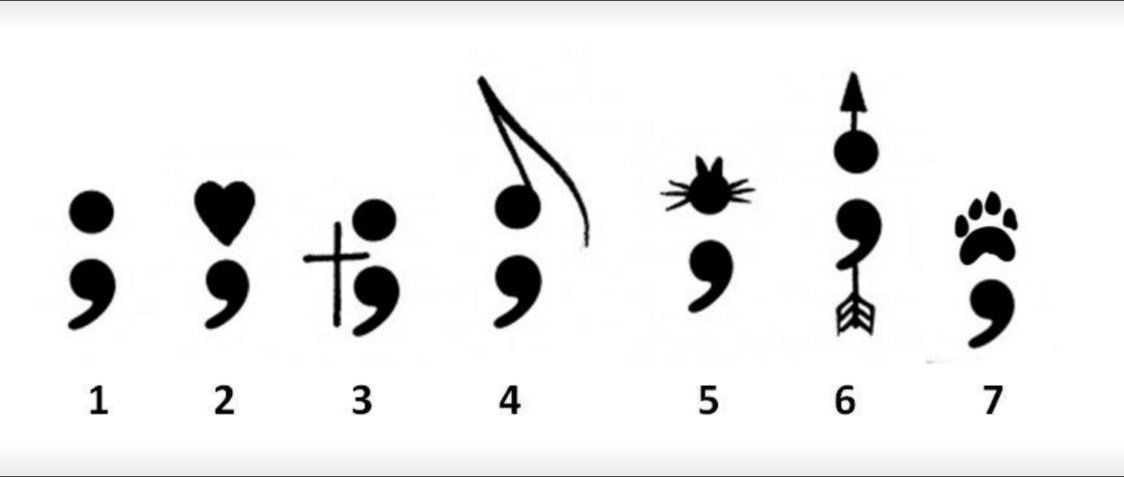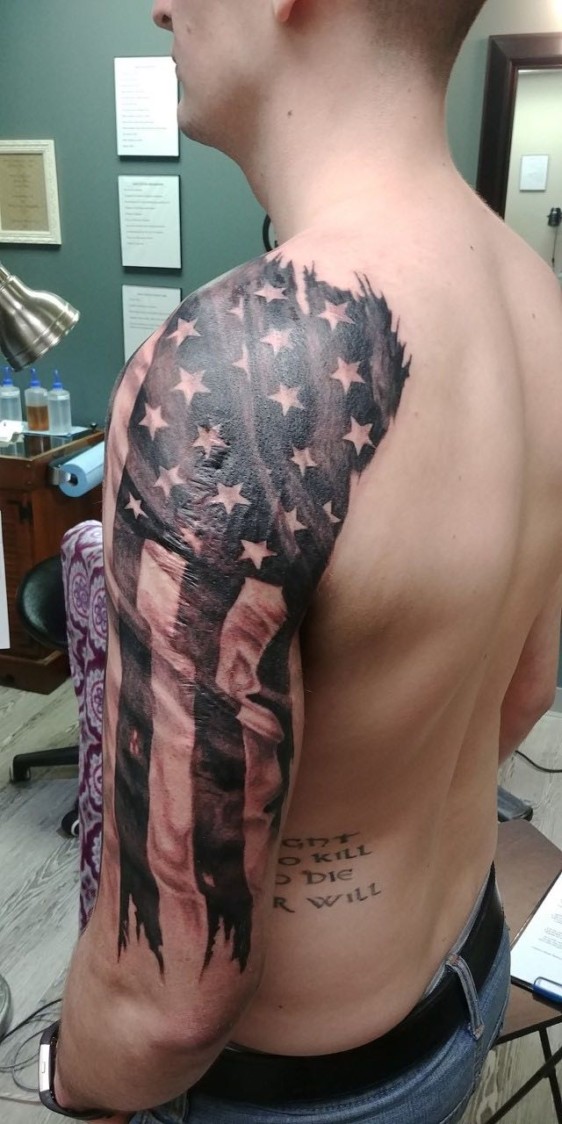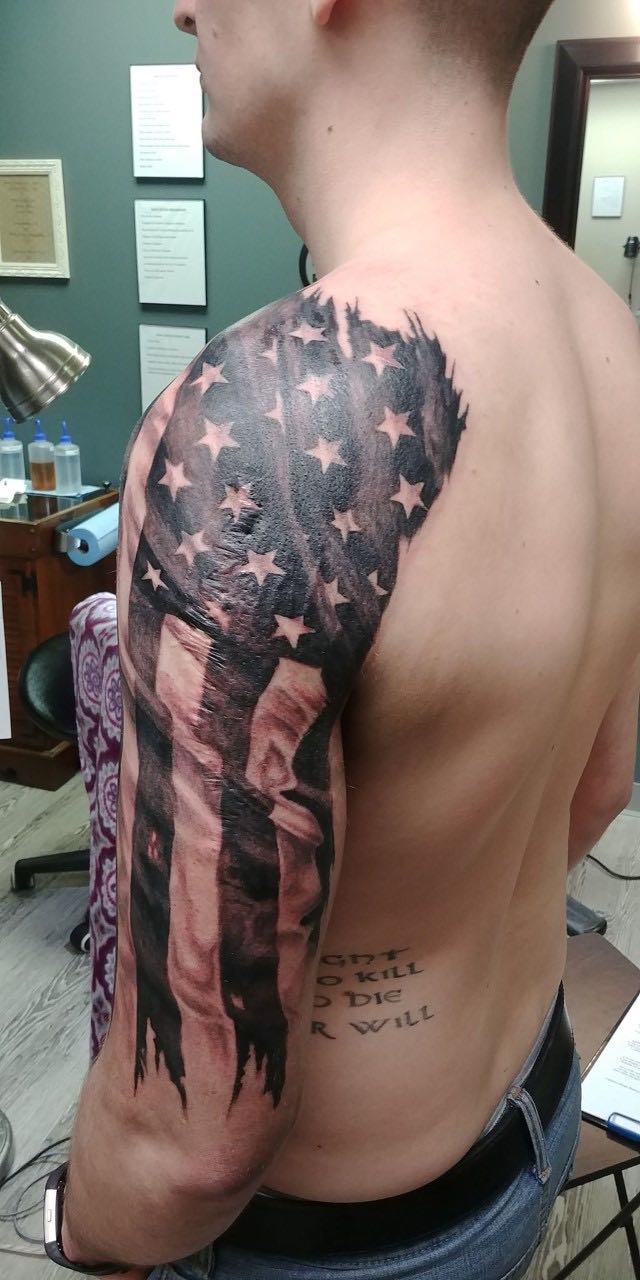Dan Abbott gave the first tattoo of the fundraiser in honor of a dear friend. Abbott, the owner of Insidious Ink Tattoos in Hiawatha, Iowa, was holding a fundraiser for suicide awareness after losing both a friend and a cousin to suicide in the same year. He gave the first tattoo of the fundraiser to the wife of the friend he’d lost to suicide.
“It broke my heart. I didn’t know what to say or how to feel,” Abbott says. “I won’t forget the fact that his wife was here very first thing, very first tattoo, and ensured that she would be the very first tattoo that I would do that day in order to remember her husband she’d lost and one of my dear friends.”
Abbott had given the couple their first tattoos in his shop just two months before his friend’s death. He remembered how excited they were to get them.
“We spent extra time with them, creating beautiful pieces they would be proud of,” Abbott says.
His devastation inspired him to take a more active stance in advocating for mental health. He partnered with Foundation 2, a suicide prevention and crisis center in Cedar Rapids, to hold a fundraiser at Insidious Ink for World Suicide Prevention Day on September 10. For the fundraiser, Abbott offers semicolon tattoos for $50. It represents a life that could have ended but instead continued on and the brave choice to keep fighting no matter what. And while the tattoo doesn’t cost any less than normal, Abbott donates 100 percent of his profits to Foundation 2.

“I told people right and left … I don’t need to make money today. This is not about me,’” Abbott says.
Breaking Down the Stigma
Angel Burns, who worked for Foundation 2 and spent the day of Abbott’s fundraiser at the shop helping, says she hopes the tattoo community can help start an open and honest conversation about mental health. Tattoos allow people who have dealt with mental health issues to let people know about their struggles without having to talk about it. They can act as silent beacons of hope and a reminder that challenges can be overcome.
“This is just the start of a great partnership between suicide awareness and tattoo shops,” Burns says.
Abbott says most people get a semicolon because they’ve struggled with mental illness or because they’re supporting someone who is struggling. It’s a sensitive topic, but most people who choose to get these tattoos want to share their stories and break the stigma of not talking about mental health.
Burns said the fundraiser was particularly meaningful to her because she has a semicolon tattoo. She started having thoughts of suicide around age 12 and was able to get the help she needed to overcome them. She says she’s thankful every day to not have acted on her thoughts.
While Burns worked for Foundation 2 she spent a lot of time with children who were struggling with the same thoughts she had at their age. She got her semicolon tattoo a few years ago to show her solidarity with their struggles. She now works for the Eastern Iowa Health Center, a medical clinic in Cedar Rapids, and says her tattoo still starts conversations.
“My tattoo is on my wrist, so I get people who ask me about it,” Burns says. “Tattoos are becoming more popular, and they’re a great way to kind of break down the stigma surrounding mental illness.”
A Worthwhile Cause
The day before the fundraiser, Abbott’s tattoo artist who had agreed to help with the event backed out, leaving him alone with nearly 30 clients scheduled. This could have ended the project before it even started, but Abbott was determined to move forward to honor the cause and the loved ones he’d lost.
“I had to scramble the day before, calling and trying to reschedule what ended up being just over a dozen clients from that day to the next day so I could tattoo everybody,” Abbott says. “I ended up tattooing everybody over the course of like two or three days. I worked 12 to 13 hours a day tattooing.”
That might seem like a long time to give 30 people small tattoos, but Abbott purposefully took the time to get to know each client, and give them the time and space to share their stories if they wanted. One in particular stood out.
“An older lady came in to get her semicolon tattoo, and … she noticed the funeral flier from my cousin passing and committing suicide that year, and we discovered that she was also a very good friend of his, and that was the reason why she was getting it,” Abbott says.
The moment was overwhelming for both Abbott and his client.
“We just stood there and cried,” Abbott says.
A Continued Partnership
The fundraiser made over $2000 for Foundation 2 and was used toward their suicide prevention work.
Elizabeth Kissling, the marketing director for Foundation 2, says Abbott has continued to give semicolon tattoos and donate his profits to the agency well after the end of the fundraiser. The donations go to their suicide prevention methods, including support groups for people struggling with mental health and people who have lost loved ones to suicide.
Kissling says partnering with Abbott and Insidious Ink has given more information and resources to people dealing with their mental health.
“One of the nice things about this partnership is that when he works, especially on elaborate tattoos for people, they get to talking, and it may come up that people talk about things in their life and they may mention having thoughts of suicide or having lost someone, so now he has information to connect them to help and can connect them to Foundation 2,” Kissling says.
Foundation 2 keeps flyers and other information in Insidious Ink, and Abbott and his staff are able to tell clients more about the services offered. Being transparent about mental health and providing resources for people in need further breaks down the notion that mental health struggles should be kept quiet.
Abbott plans to hold the fundraiser every year and has plans to keep a donation box for Foundation 2 in his shop year round.
A Different Kind of Healing
Abbott is not the only tattoo artist in Iowa helping people who have struggled with mental health. Tattoo artist Audrey Karine, who works at Works of Ink, a Des Moines tattoo shop, tattoos over self-harm scars, turning painful memories into something beautiful.

She tries not to call them cover-ups because she says the word implies that scars or previous tattoos are being erased. The better word, she says, is disguise.
“As an artist you can’t cover anything up … you can hide things, but tattoo ink is transparent, so even if you have black ink covering you, you can still see freckles through it,” Karine says.
Since self-harm scars are usually a series of many scars, Karine tries to avoid what she calls flat designs, designs without a feeling of movement, or designs with a lot of lines, as she says those can actually make the scars more pronounced. She tries to use movement to distract the eye and draw it away from the scars.
“You’re putting something more interesting, something with more texture, more movement,” Karine says. “Something going on over it, that when the eye looks at it, it’s still going to be there, but it doesn’t fix on it because it’s going to be busy looking at what’s going on around it,”
Disguising self-harm scars is not Karine’s most common work, but it is some of her most important. She started as a regular tattoo artist, and after disguising several scars, found she enjoyed the challenge of turning old or unwanted tattoos into a beautiful piece of art her clients treasured.
Tattooing over self-harm scars is a deeply personal and emotional experience. Karine works to make her studio a safe, comfortable space to let clients know their stories will be heard and respected.
“If they wanna talk and joke around, we talk and joke around,” Karine says. “If they’re getting emotional and sensitive about something, I listen to them and try to give them support.”
While not every client wants to share their stories, Karine wants them all to know that they are supported in her studio and that she’ll listen if they’re willing to talk.
“People feel kind of comfortable with you because you’re kind of this anonymous person that they can tell stuff to and you’re not going to affect their life,” Karine says. “They can tell me their heart-wrenching truths, and it doesn’t change anything.”

